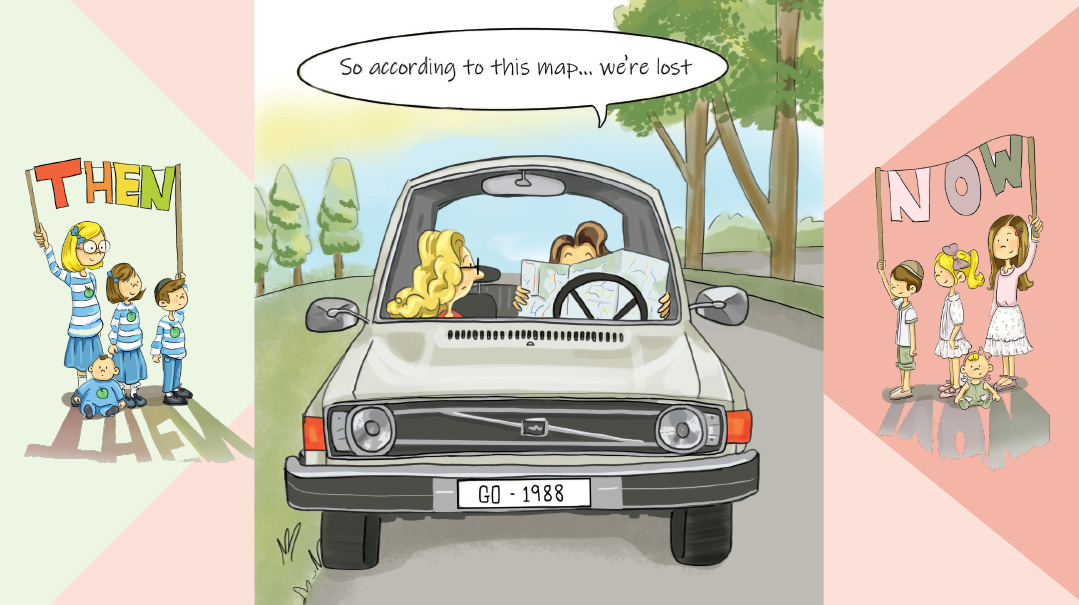Emerging from the Darkness

Course 001: Former espionage agents teach the tricks of their trade: people skills

After a difficult childhood and divorce, Psychotherapist Batel Vaknin teamed up with 001 — a specialized seminar on confidence and communication created by former Israeli intelligence and security personnel from the Shabak — to bring the course to the chareidi world
I
t’s a truism that emotional healthiness finds and begets more healthiness. But in order to learn this, Batel Vaknin needed to experience the reverse.
Life hadn’t been easy for Batel. Her parents’ divorce when she was young hit her hard, and later, she struggled when her mother remarried. While her mother and stepfather raised a large blended family, she felt unmoored. Her teen years were tumultuous, and she struggled to fit into her family, to make sense of her tremendous emotional pain, to find her place.
“But even amid the deepest moments of pain,” Batel recalls, “I felt something — a presence, a calmness. Hashem? ‘There’s a purpose to all this,’ I’d tell myself. Even then I knew my pain had a purpose, that one day I would channel it.”
Batel married young. She soon realized that her marriage wasn’t healthy, but it was a catch-22, as remembering her parent’s divorce, Batel resolved that she’d never go down that path. Eventually, though, it became clear to her that she needed to end her marriage.
“My world was crazy for a long time and after the divorce I had a lot to process. I went on a long journey to get to know myself,” she says. “A journey of healing, which taught me to become emotionally independent, to have healthy self-love.”
Batel went to college, studied psychology and became a psychotherapist. “I studied the soul, the human emotional world and its connection to healthy relationships,” she says. She surrounded herself with supportive people and looked for mentors who could guide her on this new path. She also looked for courses that would help her strengthen her self-awareness and relationship skills — and there was one unlikely course that proved life transforming.
The course, 001 — a name meant to evoke codes used by the intelligence department — was created by a group of personnel from the Shabak, the Mossad, and the police force, people who had served in interrogation and espionage roles. It focuses on developing confidence and better communication skills, and it teaches real-time truths about humans, motivation, interests, and results.
Former intelligence agents seem unlikely candidates for the creation of this type of course. But while it’s the daring action and exploits that often get the spotlight in thrillers and spy novels, the real strength of intelligence agents lies in their psychological knowledge: of themselves and of humanity, and in using that knowledge to assess motives quickly, to react decisively and correctly in tense and dangerous situations, when the stakes are huge.
Through on-site exercises and homework, Batel and the other course participants essentially used their own lives as a training ground to implement what they were learning, all under the guidance of mentors.
“This isn’t therapy where people delve deeply into their stories,” Batel explains. “It’s not personal. It’s universal psychology. It’s about understanding how people work, how you work, how you can play to your advantage, show up as your best self, and give yourself a really good shot at a crucial opportunity.”
A Frum Version
Batel found the course so transformative that she resolved to bring it to her community. “When I took the course, I filtered out what was inappropriate for a frum woman,” she says. “But I knew it could be so much better if those who run it would have an understanding of the chareidi demographic and adapt it accordingly.”
The course organizers were wary at first, Batel recalls, but were soon excited by the challenge. “They put themselves in the mindset of religious people,” Batel says. “They really tried to get the cultural nuances, and they were able to connect to the chareidi women who took the course.”
Batel believes this course has special value for the frum community. “The frum way in dating and marriage means that we don’t get a chance to really try out a relationship before committing,” she notes. “The adapted 001 course enables women to get to know themselves vis-à-vis the relationships they currently have with family and friends, to identify other people’s motivations, what you don’t like about your relationships and what you do like. You learn to do this in real time. The ideal is to be able to nip something unhealthy in the bud, to stop a destructive cycle and save a marriage, and when that’s not possible, to ensure a woman doesn’t fall into a toxic relationship again.”
A prerequisite to emerging from a toxic relationship is for a person to realize they’re being manipulated and mistreated, for them to realize that the other person in the relationship has a self-serving agenda.
“The chareidi world is replete with goodness, but also naivete,” Batel says. “We want to believe that people’s interests are altruistic, that they only want to build a bayis ne’eman b’Yisrael, and this can feed denial, causing us to turn a blind eye to an unhealthy relationship. I’ve seen many women who are only just becoming aware of what actually happened to them, who are in a difficult emotional place. But it’s also a critical juncture in their lives, where they often need to present a persona to social services and navigate the court system.”
And it’s here that 001 can step in to fill that crucial gap, giving these women the tools they need to make tough decisions, communicate skillfully, and take back control of their lives.
The first and underlying concept is that of self-belief and recognizing self-imposed limits.
In the field of intelligence, a person needs to push against themselves, their own fears, doubts, and insecurities. “It’s really only thoughts that stop you from doing anything,” Batel says. “Take the task of impersonating someone, for example. Thoughts like, I can’t do it, they won’t believe me, I’m not good enough, can surface and become debilitating. In trainings for espionage missions, agents work on beating those thoughts, turning negative beliefs on their heads, until they can do just about anything. Follow an armed criminal? You can do it — if you believe you can.”
Beat That Thought
Instructor Shir Peled, the first female spy to impersonate an Arab woman, shared with course participants how she was able to walk around, in a hijab, in an Arab marketplace — hostile, dangerous territory. She had to banish negative thoughts, beat the life out of them, and only then could she show up on a sandy street in Gaza, posing as an Arab housewife, helping to nab a wanted terrorist.
Shir didn’t speak fluent Arabic. She knew the basics, but so much as opening her mouth would reveal her true identity. But even without speaking there was so much she could do right, in stepping into her role, and in leading on the Arabs around her to aid and abet her cause.
“Shir showed us how you could rid yourself of your own negative thoughts, how you could do anything you want or need to,” says Lea, a participant. “In the summer after the course, my family went water rafting, and I, a non-swimmer, thought, no way, I’m a mom, I’m too old for this, I don’t have it in me to jump into the water from a height of two meters. But hey, they were just thoughts, that’s all that stood before me and the raging river. And… I did it, I jumped.”
Lea continues, “We learned to get out of our comfort zone, to be comfortable in ourselves — if Shir could do it in a village of Arabs, we could do it while facing the court system, the social services people. We could be ourselves, show up as ourselves, in situations where for us the stakes are high — such as custody of our children.”
The Power of Communication
The course puts an emphasis on challenging yourself and your perception of your ability and comfort level. It also teaches you to understand others: how to identify their interests, agenda, and determine if they’re manipulating you.
Manipulation is a neutral, not a negative word, says Batel. “It’s essentially another word for interest. You learn to identify and recognize the other person’s interest. Once you know that, it’s back to you and your communication skills. Effective, impactful communication skills can bring about results, and course participants learn to use these skills to protect and assert themselves.”
The course also focuses on unspoken communication. “There’s so much in body language, you wouldn’t believe it,” Lea says. “We watched a clip of Netanyahu meeting Obama some years back, how he consciously mimicked his behavior, drawing Obama in. Obama’s left hand went up, Netanyahu’s left hand went up. Obama straightened his collar, Netanyahu straightened his collar, smile, smile, all good!”
On some level, people do this subconsciously; it’s part of social skills. But becoming aware of it and learning how to use it deliberately makes all the difference.
“If I’m two minutes late for a flight check-in, and the clerk at the desk looks tough, I can draw on what I’ve learned,” Lea says. “What are her motives here? How do I approach her in a way that will increase the chances she’ll let me check in?”
“When I first attended the 001 course, I was dealing with a protracted custody court case,” says Chana, another course participant. “I knew that first impressions were really important, and that the court would judge me right from the get-go. I had no idea that I could have a hand in my fate, but I learned the impact of the smallest communications, and leveraged those — how to sit, the type of language to use, even the color of my clothing. I learned to form a personal connection, to question, to stick up for my rights. I was able to show up as the best me, even in circumstances that were objectively uncomfortable. And this led to surprisingly positive outcomes in court.”
Field Trip
The course also includes real-life, real-time exercises to help the women put their new knowledge to the test. To practice this newfound confidence and build communication skills, the women were taken to a mall, where they were paired up and given a task, such as, “Make a person go to a different floor,” or “Get a free coffee,” or “Find out someone’s birthday.”
Half an hour later they regrouped to find out how it went.
Using body language to put a grandmotherly woman at ease, two participants struck up a friendly conversation with her and found out her birth date.
Asking someone for help enabled two of the women to get a random shopper to move up to a different floor.
And the two who needed to procure a free coffee had one of them feign a fainting spell right across from the coffee shop, and the other “coming to her rescue” by getting a coffee on the house to “help her recoup her strength.”
“It was kind of crazy,” Lea says, “but it was about us, not the other unsuspecting people at the mall, and this is how we learned to move out of our comfort zone, break free of restraining thoughts, use positive engagement strategies. Look at what happened!”
In Control
Lea and Chana are just two examples of the women who credit the course with putting their lives on an upward trajectory.
“Of course, there’s room for individual therapy in a story of abuse or toxicity, and it’s a must,” Batel says. “But this course gives us something else. It teaches universal truths about human psychology and how to use that to our own advantage. Ultimately, outcomes are determined by Hashem, but we have so much more agency than we realize. We can be proactive and try and better a situation. That’s essential hishtadlus. We have two options in life. To passively accept our circumstances, or to understand our own power in shaping a different reality. It’s a whole different world when we choose to react and to live. U’bacharta bachayim. And every person deserves a life!”
For Batel, who today works as a psychotherapist and has recently set up a center to offer her own courses of emotional healing for women, bringing the 001 course to her community and seeing its very real impact was both gratifying and healing. “I want to help women restore their quality of life, both within marriages — because divorce is always a last resort — and when they’ve had to put an unhealthy marriage behind them.
“I realized I’d endured a lot so that I could learn to choose a life of happiness, compassion, and self-acceptance — and help other women who need to come out of the darkness of their lives and see light.”
Escaping the Snake
A course participant shares her story
MY
mom died when I was three years old. A year later, my dad remarried, and from the onset I was a thorn in the side of their new marriage. His new wife struggled to accept that I was an inseparable part of the picture, and my dad — young, inexperienced, and trying to rebuild — didn’t know how to navigate that.
From one day to the next I found myself in a strange bedroom in a strange house, a large, shadowy, and unfamiliar place. In that uncomfortable new bed, I couldn’t fall asleep. I curled up in my pitch-black room, with a light switch higher than I could reach, my fear thick. I felt so alone and afraid.
My dad and stepmom started a family together. They were blessed with one child after the other. I was always different. I didn’t belong. My stepmom would buy ice cream for everyone and forget about me.
I had to not care. I had to behave well all the time. I became wise beyond my years, a girl whose only dream was to feel loved, to belong.
Because my father and stepmother got married when I was so young, people didn’t necessarily know that we were a blended family. I was determined they shouldn’t find out. I felt so different and unwanted myself, I didn’t need the judgment from others too. At school, I excelled. I was popular, fun, outgoing. I had to be the best, academically, socially. I had so little self-worth I needed to prove I was worth something.
My dad and stepmother went on to have seven children. A happy family — with one extra.
For years my stepmother would make me feel that I didn’t really belong. I was a reminder that there’d been a history that everyone was trying to quash.
In candid moments, I said to my dad, “This isn’t normal. You know it isn’t.”
“I’m sorry for your pain,” he said, but seemed to feel there was little he could do.
It was deep, keening pain, trying to fit into my teenage body, to figure out my identity, in a home I had mixed emotions toward.
My relationship with my stepmother was toxic.
Sometimes I was able to stay strong.
But only sometimes. At other times I fell into self-doubt, believing I was at fault for our relationship.
By the time I hit my teens, self-recrimination and self-hatred were eating away at the conviction I had that insisted I was worth more.
By 15, I turned to food, emotional eating. Food became my friend, it made me feel better for the moment, it never criticized me. And it left its mark. I was a short kid, and by the end of tenth grade, I weighed over 230 pounds.
I fell into a depression. “I’m not going back to high school until I can change how I look,” I told my father.
With a therapist I realized this: My heart had been hurt so many times, with my big body I’d created a buffer. Becoming fat was a sort of self-protection: You can’t touch me, you can’t reach my heart.
Whoa. That was it. And if I could see it for what it was, I didn’t need it, right?
Wrong.
That summer I went under the knife, and had a gastric band put in. I was 16 and went into the cold operating room alone.
The procedure was a whopping success. Throughout 11th grade I lost 140 pounds. People complimented me, said how good I looked. But they couldn’t see inside. I’d lost the blubber, but my self-esteem was fragile as glass. The problems didn’t go away with the fat, they were redirected. In short order, I became anorexic.
The anorexia got so bad that I was referred to the eating disorder clinic at Hadassah Ein Kerem. There was little will left inside me to heal. I was withering away.
I’d lost trust in my world.
Even though I’d all but starved my belief in myself, there was still something alive. Just enough to hang onto the hope offered by a young man who was introduced to me at the time.
The last thing I needed at that unstable point was to get into a serious relationship, but I was vulnerable, swept away.
I learned soon enough.
After the razzle-dazzle of the wedding period was over, came the toxic cycle of abuse. Control. Obsessiveness. Exploitation of my weak points. Angry explosions. Door slams.
Then there’d be reconciliation. A honeymoon period, where once again I felt loved, wanted, that I belonged.
And once again I’d be filled with hope that the relationship would work out, and I’d tell myself that things had changed, that from now on things would be good.
Outside the home my husband was a chivalrous gentleman, all sweet words and gestures. People were jealous of our marriage. Even I was really confused.
I also didn’t know any different; I’d never experienced a healthy relationship.
Things got worse.
There I was, again cleaning up a crazy mess after he’d raged, picking up the pieces, wondering what it was this time.
On occasion, if I was strong and had a flash of clarity, I’d stick to my guns, and not apologize. In those instances, he would have to have some regret. That was the only fluid part of his cycles of rage, where I had a modicum of control.
I felt hollow, empty, scared, but I blamed myself. The denial was so strong, I pulled the wool over my own eyes, and kept reaching the same conclusion — that the issue must be with me.
I leaned into the honeymoon phases that characterize abusive relationships, taking my husband’s regret at face value. But those phases weren’t real, he was using them just enough so that he could buy me back, and over time, it took less and less to buy me back.
Abuse is a cycle, it’s like a spiral, with the circles getting smaller and smaller, everything happening more often. Explosion, regret, honeymoon, explosion, regret, honeymoon, explosion….
I heard it compared to a snake coiling around a victim, starting off with a wide circle, but gradually the coils get smaller and smaller, and that’s how it chokes its victim of life.
Still, I couldn’t make a move.
And then Hashem himself lifted me out from the snake’s grasp.
One evening I had clarity. I realized that we needed to divorce.
That was a moment of clarity that led to my freedom — but it took so much more than a fleeting flash of clarity to truly heal. I needed to work hard, to learn, to develop the skills and knowledge that my difficult past had deprived me of.
I heard about the 001 course from Batel, my therapist at the time. She had a story so similar to mine and had taken the course, what better recommendation?
The course was able to take my healing to the next level. With so many unhealthy relationships forming the foundation of my life, it was no wonder I’d always struggled to form healthy relationships. I felt that I was finally able to understand the way humans generally work.
After taking 001, I felt I’d managed to crack the most complicated system: My relationship with my self. And from there, I was able to learn healthier ways to communicate and relate to others.
Today, I’m a different woman. I’ve learned to listen to myself, show up with strength. A snake couldn’t go near me.
(Originally featured in Family First, Issue 884)
Oops! We could not locate your form.







